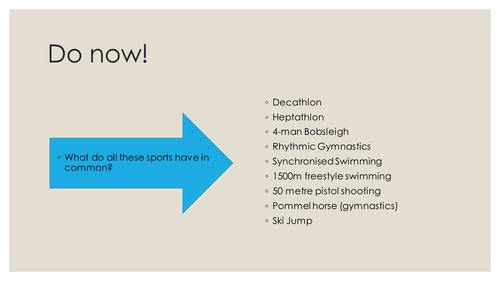



This is a topic that I would advise be completed over a two lesson period rather than rushed and squeezed into one.
In my experience, most of my GCSE classes believe that sport ISN'T sexist because they see top sportswomen representing their country and people like Karren Brady and Delia Smith being influential figures at football clubs.
This lesson seeks to redress those beliefs and enable students to apply a more balanced and thorough view.
The lesson begins with a Do Now task where the answer is that all the activities are competed by only one gender.
The main part of the lesson are a number of tasks to be completed. These can be done on an individual level or in groups. The activities are as follows:
Select and retrieve. Students read one of the two articles and select passages of interest and relevance.
Spot the difference. Students look at the differences between the genders in two different sports.
Mystery Guest. Students name the sportspeople and attempt to explain whether they found it more difficult to name one gender over the other.
Gender Equality. To add some balance there are examples of women being treated "equally" in sport, but is it fair?
What’s your opinion? Some statements about sports issues that may or not be deemed sexist. Students should formulate an opinion based upon them and be able to explain their thought processes.
Why the difference? A number of sports are listed with examples of the differences between them when it comes to gender participation with some questions to answer.
Once students have collated some information from their sheets they get into groups with students who have had different sheets and share their info. It's important that they make notes so that they have a broad view of sport as opposed to just their info. sheet.
Using these notes, students should then pick out their best points and complete the "writing to argue," worksheet. This should be the tool that enables students to write an essay using their knowledge to support their opinion. This can be done as a homework task if required.
Any feedback, positive or developmental, is greatly appreciated.
In my experience, most of my GCSE classes believe that sport ISN'T sexist because they see top sportswomen representing their country and people like Karren Brady and Delia Smith being influential figures at football clubs.
This lesson seeks to redress those beliefs and enable students to apply a more balanced and thorough view.
The lesson begins with a Do Now task where the answer is that all the activities are competed by only one gender.
The main part of the lesson are a number of tasks to be completed. These can be done on an individual level or in groups. The activities are as follows:
Select and retrieve. Students read one of the two articles and select passages of interest and relevance.
Spot the difference. Students look at the differences between the genders in two different sports.
Mystery Guest. Students name the sportspeople and attempt to explain whether they found it more difficult to name one gender over the other.
Gender Equality. To add some balance there are examples of women being treated "equally" in sport, but is it fair?
What’s your opinion? Some statements about sports issues that may or not be deemed sexist. Students should formulate an opinion based upon them and be able to explain their thought processes.
Why the difference? A number of sports are listed with examples of the differences between them when it comes to gender participation with some questions to answer.
Once students have collated some information from their sheets they get into groups with students who have had different sheets and share their info. It's important that they make notes so that they have a broad view of sport as opposed to just their info. sheet.
Using these notes, students should then pick out their best points and complete the "writing to argue," worksheet. This should be the tool that enables students to write an essay using their knowledge to support their opinion. This can be done as a homework task if required.
Any feedback, positive or developmental, is greatly appreciated.
Something went wrong, please try again later.
This resource hasn't been reviewed yet
To ensure quality for our reviews, only customers who have purchased this resource can review it
Report this resourceto let us know if it violates our terms and conditions.
Our customer service team will review your report and will be in touch.
£3.00
